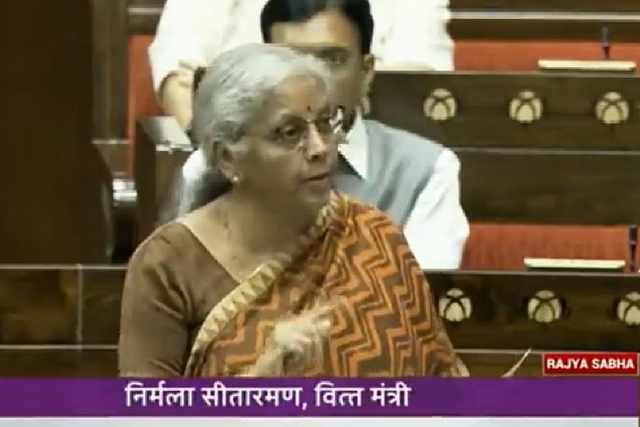News Brief
"Not A Jumla": Nirmala Sitharaman Explains Legalities Of Women's Reservation Bill In Rajya Sabha

Nirmala Sitharaman explaining Women's Reservation Bill
Union Finance Minister Nirmala Sitharaman answered why the Modi government took nine years to bring the Women's Reservation Bill on Thursday (21 October) in Rajya Sabha. She said, "We believe in building consensus", hence the time was needed.
Explaining the salient features of the bill, she said that it would bring a new article 330A to provide women reservation in Lok Sabha and Article 332A to provide women reservation in state legislative assembly.
She further explained, "Existing Article 239AA is proposed to be amended to provide women reservation in the legislative assembly of National Capital Territory of Delhi."
"There shall be a reservation for women belonging to Scheduled Castes (SC), Scheduled Tribes (ST) in respect of the seats reserved for SCs and STs. Consequential amendments will also be made for Puducherry and J&K," she added.
"Article 334A is inserted into the Constitution. It intends that after the bill is enacted, whenever the first census takes, a fresh delimitation exercise shall be undertaken for providing reservation for women," Sitharaman said.
"This exercise of delimitation will be limited to identifying the number of seats and those seats which have to be reserved for women and it shall not affect the inter se distribution of seats of Lok Sabha and the legislative assemblies of the state," she added.
Sitharaman added that the main feature is that it will not apply until the Lok Sabha or legislative assembly of the state is dissolved. She reiterated that the old bill is not pending.
She cited examples of Satyakama's mother and Mandan Mishra's wife who judged the debate between Adi Shankaracharya and Mandan Mishra to explain the position of women in ancient India.
Sitharaman quoted BJP's 2014 and 2019 manifestos to point out that women's reservation was always on their agenda. She also praised Modi government for banning triple talaq.
She highlighted the Modi government's efforts to empower women through Ujjwala Yojana, Swachhata Abhiyan, Beti Bachao Beti Padhao, MUDRA loan scheme, increasing maternity leave and permanent commissioning of women in the armed forces.
Sitharaman also answered the question that why a special session was called. She said, "We wanted to start working in the new building with a historic bill".
"It was disheartening to hear some members calling this bill a jumla. This bill is not a jumla. The legal processes which need to be adopted for enabling this bill have been defined and described," she said.
"Delimitation is a quasi-judicial process. It needs an appointment by law. The commission needs a retired Supreme Court judge, members from the election commission, from every recognised party," she explained why time is needed for implementation.
Sitharaman elaborated, "It shall not be possible to implement the bill in 2024." She pointed out that whenever this bill was brought for discussion, every time the BJP supported it.
Answering the allegations against RSS for not having women members, she said everyone knows how this organisation helps during the time of disasters. "They are completely dedicated for social service and keeping people together," she added.
"RSS has a Sevika Samiti for women. If it's worrying a member why RSS doesn't take women, let me ask him, how long did it take for former member Brinda Karat to get into the Communist polling bureau," Sitharaman responded.
She answered Kapil Sibal that the 1971 census was being used till 2014 for Finance Commission reports and from the 15th Finance Commission (2020-2025), the 2011 census is being used.
Talking about the readjustment of seats, she quoted Article 82 which asks for readjustment after each census. "In 1976, the 42nd Amendment of the Constitution inserted two provisions to this article," she added.
"First proviso provides as to when readjustment shall take effect and the second proviso provided that readjustment shall not be necessary until a new census is done and its figures are published after the year 2000," she explained.
"Thereafter, this freeze till 2000 was amended in 2002 and 2000 was replaced with the year 2026. 2026 is not our imagination," Sitharaman said.
"So, as the first census of 2026 will be undertaken in 2031. Until that period, there shall be no readjustment and seats shall remain unchanged is the position," she added.
"Once the census is completed, delimitation commission can be set. It will do its job for Lok Sabha and state assemblies and the reservation will get implemented," Sitharaman cleared her point.
On the question of OBC reservation, the Finance Minister explained, "There is no specific mention of electoral reservation in the Constitution for OBCs as there is mention of SCs and STs. Hence, this bill provides women reservation for General, SC and ST categories."
Support Swarajya's 50 Ground Reports Project & Sponsor A Story
Every general election Swarajya does a 50 ground reports project.
Aimed only at serious readers and those who appreciate the nuances of political undercurrents, the project provides a sense of India's electoral landscape. As you know, these reports are produced after considerable investment of travel, time and effort on the ground.
This time too we've kicked off the project in style and have covered over 30 constituencies already. If you're someone who appreciates such work and have enjoyed our coverage please consider sponsoring a ground report for just Rs 2999 to Rs 19,999 - it goes a long way in helping us produce more quality reportage.
You can also back this project by becoming a subscriber for as little as Rs 999 - so do click on this links and choose a plan that suits you and back us.
Click below to contribute.
Latest